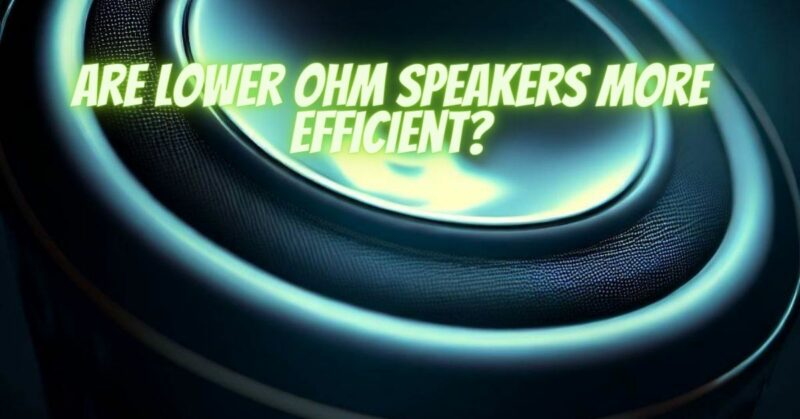In the world of audio, the concept of efficiency holds significant importance. When it comes to speakers, the impedance of the speaker is often associated with its efficiency. A common misconception is that lower ohm speakers are inherently more efficient. This article aims to shed light on the relationship between speaker impedance and efficiency, debunking the myth and exploring the nuanced factors that truly impact a speaker’s efficiency.
Understanding Speaker Impedance
Speaker impedance, measured in ohms, represents the electrical resistance a speaker presents to the amplifier’s current. It’s an essential parameter that affects how the speaker interacts with the amplifier and the overall performance of the audio system.
The Efficiency Misconception
The notion that lower ohm speakers are more efficient is not entirely accurate. While it’s true that lower impedance speakers (e.g., 4-ohm) can draw more current from the amplifier, the relationship between impedance and efficiency is more complex.
Efficiency Defined
Efficiency in speakers refers to the ability to convert electrical power into sound output. A more efficient speaker converts a higher percentage of electrical power into sound, resulting in higher sound output per unit of input power.
Efficiency Factors Beyond Impedance
Efficiency is influenced by a multitude of factors beyond impedance:
- Sensitivity Rating: A speaker’s sensitivity rating, measured in decibels (dB), plays a crucial role in efficiency. Speakers with higher sensitivity ratings can produce louder sound levels with the same amount of input power.
- Driver Design: The design of the speaker’s drivers, such as the cone, voice coil, and magnet assembly, affects how efficiently the speaker converts electrical signals into sound waves.
- Enclosure Type: The type of speaker enclosure (e.g., sealed, ported) impacts the efficiency by affecting the air movement and resonance of the speaker.
- Amplifier Matching: The compatibility between the speaker’s impedance and the amplifier’s capabilities influences power delivery and, consequently, efficiency.
Impedance and Power Handling
Lower impedance speakers might draw more current from an amplifier, potentially allowing them to handle more power. However, this doesn’t directly translate into higher efficiency. A speaker’s sensitivity rating remains a more critical factor in determining overall efficiency.
Choosing the Right Speaker
When selecting speakers, consider the following:
- Sensitivity Rating: Look for speakers with higher sensitivity ratings for more efficient sound output.
- Purpose and Application: Choose speakers that match the requirements of your audio setup, whether it’s for home entertainment, studio monitoring, or car audio.
- Quality and Design: Quality driver design, along with an appropriate enclosure type, plays a vital role in the overall efficiency and sound quality of the speaker.
The myth that lower ohm speakers are inherently more efficient is a misconception that needs to be clarified. Speaker efficiency is a complex interplay of sensitivity, driver design, enclosure type, and amplifier matching. While lower impedance speakers might handle more power, their efficiency is not solely determined by impedance. When selecting speakers for your audio setup, consider all relevant factors to ensure the optimal balance between sound quality, power handling, and efficiency.


